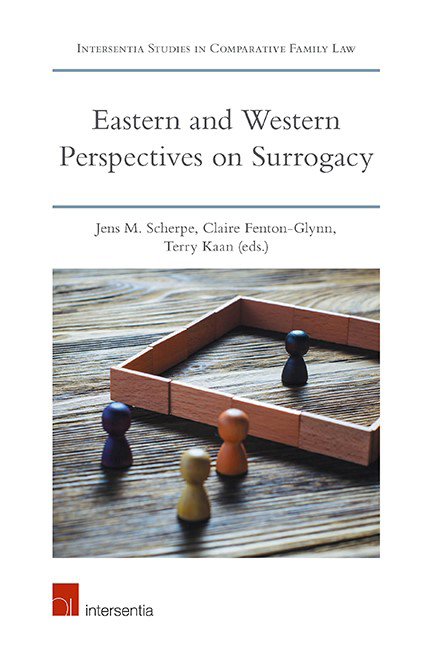Book contents
- Frontmatter
- Preface and Acknowledgements
- Contents
- List of Contributors
- Introduction
- Questionnaire
- PART I WESTERN PERSPECTIVES
- THE PROHIBITIVE APPROACH
- THE TOLERANT APPROACH
- Australia
- Australia: A Judicial Perspective
- England and Wales
- England and Wales: A Judicial Perspective
- THE REGULATORY APPROACH
- THE FREE MARKET APPROACH
- THE INFLUENCE OF INTERNATIONAL COURTS
- PART II EASTERN PERSPECTIVES
- THE PROHIBITIVE APPROACH
- A TOLERANT APPROACH?
- REGULATION THROUGH PROFESSIONAL MEDICAL BODIES
- FROM FREE MARKET TO REGULATION
- PART III COMPARATIVE PERSPECTIVES ON SURROGACY
- Index
- About the Editors
Australia
from THE TOLERANT APPROACH
Published online by Cambridge University Press: 26 June 2019
- Frontmatter
- Preface and Acknowledgements
- Contents
- List of Contributors
- Introduction
- Questionnaire
- PART I WESTERN PERSPECTIVES
- THE PROHIBITIVE APPROACH
- THE TOLERANT APPROACH
- Australia
- Australia: A Judicial Perspective
- England and Wales
- England and Wales: A Judicial Perspective
- THE REGULATORY APPROACH
- THE FREE MARKET APPROACH
- THE INFLUENCE OF INTERNATIONAL COURTS
- PART II EASTERN PERSPECTIVES
- THE PROHIBITIVE APPROACH
- A TOLERANT APPROACH?
- REGULATION THROUGH PROFESSIONAL MEDICAL BODIES
- FROM FREE MARKET TO REGULATION
- PART III COMPARATIVE PERSPECTIVES ON SURROGACY
- Index
- About the Editors
Summary
GENERAL LEGAL FRAMEWORK
Surrogacy is specifically regulated in Australia. Australia is a federation in which most matters of family law are regulated nationally, but some issues including surrogacy and assisted reproductive technology are principally regulated by the states and territories. All six states and the Australian Capital Territory (‘ACT’) have legislation dealing with surrogacy. The laws in these seven jurisdictions are broadly similar in three respects. First, commissioning parents in altruistic arrangements can apply, post-birth, for a ‘parentage order’, transferring parental status from the surrogate parents to the commissioning parents. Second, the surrogate mother can enforce the commissioning parents ‘promise to reimburse her reasonable expenses associated with the arrangement. Third, commercial surrogacy is prohibited.
Federal family law does not specifically regulate surrogacy, but is relevant because commissioning parents sometimes apply under federal family legislation for orders that they have parental responsibility for children born in surrogacy arrangements, declarations of parental status, or leave to adopt. Federal immigration and citizenship law is also relevant to international surrogacy arrangements.
There is currently no legislation in the Northern Territory regulating surrogacy. Australian medical practitioners, including those in the Northern Territory, must adhere to the National Health and Medical Research Council's Ethical Guidelines on the Use of Assisted Reproductive Technology in Clinical Practice and Research.
There is no specialised authority which oversees surrogacy nationally. Statutory authorities in Victoria and Western Australia have a role in regulating some surrogacy arrangements. In Victoria, registered assisted reproductive treatment providers can only carry out surrogacy arrangements that were approved before conception by the Patient Review Panel of the Victorian Assisted Reproductive Treatment Authority (‘VARTA’). This is only permitted in altruistic surrogacy cases. If the arrangement was commissioned with the assistance of a registered assisted reproductive treatment provider, a Victorian court can only make a parentage order if the Patient Review Panel approved the arrangement.
- Type
- Chapter
- Information
- Eastern and Western Perspectives on Surrogacy , pp. 85 - 104Publisher: IntersentiaPrint publication year: 2019
- 1
- Cited by



